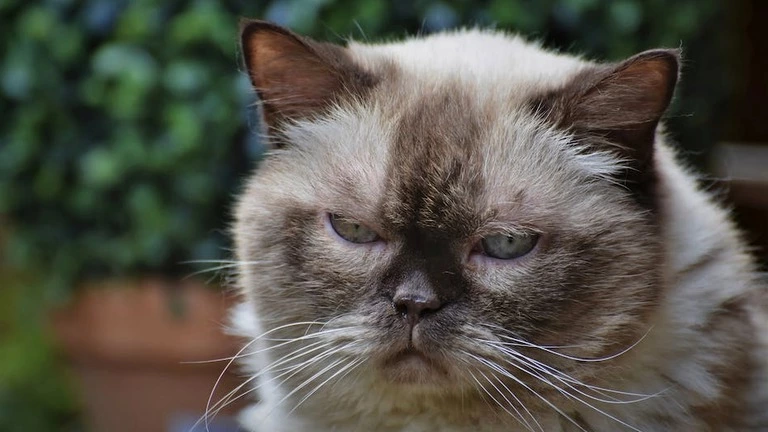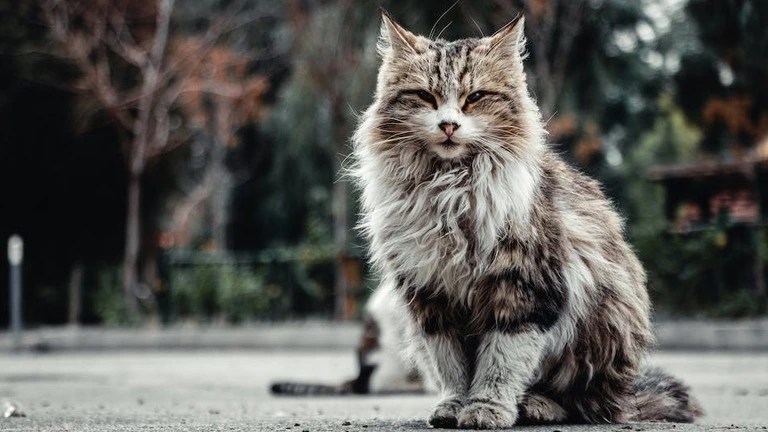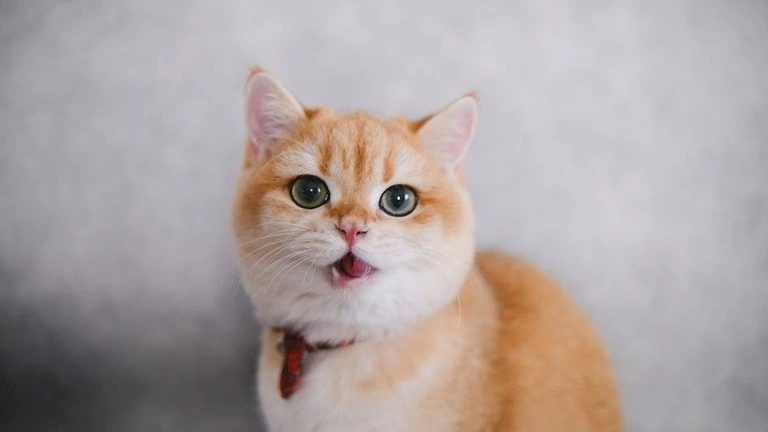A Himalayan Maine Coon mix is a cross between a Himalayan and a Maine Coon cat. Both the Himalayan and the Maine Coon are popular breeds with distinct physical and personality traits.
A Himalayan Maine Coon mix may display a combination of physical and personality traits from both breeds, and the exact combination can vary from cat to cat. However, it’s important to remember that every cat is unique and may not necessarily conform to breed standards.
A Maine Coon is a Siamese-type cat with a longer lifecycle. They are described as rare and endangered, making them expensive. The Himalayan-coated Cat is a variant of the domestic cat with white or lightly tinged skin and fur. These cats are known for being short lived, usually only one year. They are more active and playful than the normal domesticated cats, making them more expensive. Their sleek, cool style can get you some attention!

They make good adoption candidates as they are more independent and don’t need to be brought in from the cold or isolation. They also like to meet people! If you are looking to adopt a cat that is not housetrained or needs special care, look into adopting an indoor only or outdoor only.
Table of Contents
Differences Between Maine Coon And Himalayan Cats
When it comes to personality, Maine Coons are very suave. They are very gentle and considerate. This is due to the fact that they were probably used to being treated with love and care in the past.
Himalayas, on the other hand, are more independent. They do not need much training and don’t like being held too much. They also do not like being spoiled. Despite these differences, these cats can be lovely companions. They can make wonderful families! If you are looking for a cat with a lot of personalities, try the Himalayan or the Maine Coon mix.
What Is A Maine Coon Cat?
A Maine Coon is a unique cat species. These cats are described as graceful, slender, and long with their tails. They have small round eyes and wide, heavy-duty ears. Their body is lean with strong muscles and a long tail.
Their skin is very sensitive and should be cared for. It should be moisturized often to stay smooth. If it gets dry, it will break out!. The color may be white, red, or solid black with some lighter spots. They can get a line of teeth on the top side! They need to keep those in place to look dignified!
What Is A Himalayan Cat?
A Himalayan is a small, furry cat with a unique look. They are described as sleek and lovable with white markings and a short, roundish life. Himalayas range in size from under 20 pounds to very large. While not supersized, some are estimated to be over 30 pounds!
This is not a large-sized breed, though. The typical length of the average Himalayan is about 20 inches long!
The second difference between the two breeds is color. While the Himalayan can be black and the Maine Coon can be tuxedo, they are not identical colors.
The Himalaya has solid midnight blue or midnight gray with slight tones of red or orange, respectively.
Mixing Breeds: What Are The Results?
When mixing different cats, it is important to take into account their individual needs. For example, if one cat loves to be in charge, then going to another would be counter-productive.
On the other hand, if one cat does not like others, then a mix of other cats is worth a try. It can help determine whether or not a mix is successful by looking at whether or not one cat gets along with the others and how well they enjoy living in a home. If two cats do not like each other’s odor or are fighting, then it would be better to keep one and the other out!

Mixing breeds is more common than you think. In fact, there are over ten thousand different registered breeds worldwide! Most breeders don’t consider what kind of “c” their new breed has until it is needed for registration.
What Are The Personality Traits Of A Himalayan Maine Coon Mix?
The personality traits of a Himalayan Maine Coon mix can be a combination of traits from both the Himalayan and the Maine Coon breeds. However, it is important to note that every cat is unique and may not necessarily conform to breed standards.
Typically, Himalayans are known for their sweet, docile, and affectionate dispositions. They are usually adaptable and get along well with other pets and children.
On the other hand, Maine Coons are known for their large size, playful and affectionate personalities, and their sociable nature. They are known to be good with kids and other pets.
How Big Do Himalayan Maine Coon Mix Cats Get?
The size of a Himalayan Maine Coon mix can vary, as it is a cross between two different breeds. However, both the Himalayan and the Maine Coon are known to be moderate to large in size.
Himalayans are a smaller breed of cat, typically weighing between 7 and 12 pounds. Maine Coons, on the other hand, are one of the largest domestic cat breeds, with males often weighing over 20 pounds and females around 15 pounds. A Himalayan Maine Coon mix may inherit traits from either breed or a combination of traits from both, so their size can vary greatly.
Some may be closer in size to a Himalayan, while others may be larger, like a Maine Coon. It is difficult to predict the exact size of a Himalayan Maine Coon mix, as it depends on a variety of factors, including genetics and nutrition.
Which One is Better For You?
While both cats seem happy and content, there may be a reason why one cat is in the better category and the other is in the worse.
If you are looking to switch kitties, consider getting a Himalayan one. They are reported to be happier and more social.
If you are looking to add another cat in your life, consider getting a Maine Coon as they are noted to be more sensitive and vulnerable. They are known to love attention!
Himalayan cats have been known to get sickly with age, losing their appetite and desire to socialize.
Do They Make A Good Companion Pet?
If you are looking to adopt a new pet, do not choose a companion pet that is not recommended as a pet. Companion pets get along well with their human family members, but it is recommended that they be treated as children until they are large.
As this pet does not socialize well, it is important to know it.
Check out their home and settings to see if it has a better environment adjustment. If you think it might need more space or love, search for a good home! Do your research and find a fit for this animal. Remember, this animal cannot be adopted at birth so if you are looking for a safeties or calmers style of love, this one does not match!
Bullet point:
Is this the right pet for someone with limited space? It is recommended that these cats are indoor cats because of the need to control its temperature and access to food and water. An outdoor life would be too much trouble for now since they do not know what temperature feels good.
Should You Get One Of These Types Of Cats?
Both the Maine Coon and the Himalayan are beautiful cats with unique characteristics. One of these cats may be a “book” cat with very long, slender legs, so you might want to look into getting one with special needs!
The Himalayan is a more sedate type of cat that does not like to get up and explore. He or she is also more inclined to prefer one kind of environment over the other. Since these cats are not typical in terms of their coat, they are called “freetype” Cats. You can find them at any stage of their lives!
The American Association of Heredity Genetics (AAHGP) suggests that people who board or care for kittens should know when they are between phases of hair growth. This occurs when a kitten is brought into an environment that does not have enough food or water or both.
When this happens, it can lead to stunted hair growth and possibly infertility.
What should I Look For When Looking For One Of These Types Of Cats?
When looking for a new cat, you should be careful to look for certain signs of behavior. Some cats are more friendly than others.
If the cat is usually solitary and not socialized with other cats, it may be more likely to be friendly. If the cat is normally playful and docile, it may be more likely to be friendly.
Finally, check their voice and weight to see if they are healthy. Although rare, a malnourished Maine Coon can turn into aggressive or even deadly.
With all of these things to consider when choosing a new cat, it may be hard to find a new Kittie! But don’t give up! There are many ways of introducing new animals into the world.
Are Himalayan Maine Coon Mix Cats Good With kids and Other Pets?
Both Himalayans and Maine Coons are known to be friendly and affectionate, which can make a Himalayan Maine Coon mix a good choice for families with children and other pets.
Himalayans are typically adaptable and get along well with other pets and children, and are known for their sweet and docile dispositions. Maine Coons are also known for their sociable nature and their playful and affectionate personalities, which make them good with kids and other pets.
However, it’s important to remember that every cat is unique and may not necessarily conform to breed standards.
It is a good idea to supervise interactions between children and pets to ensure that everyone is safe and happy. Additionally, early socialization and training can help a Himalayan Maine Coon mix adjust to living with children and other pets.
What Is The Average Lifespan Of A Himalayan Maine Coon Mix Cat?
The average lifespan of a Himalayan Maine Coon mix cat can vary, but typically, healthy cats can live anywhere from 12 to 15 years or more.
Factors that can impact a cat’s lifespan include genetics, nutrition, exercise, and overall health. It’s important to provide proper care, including regular vet check-ups, a healthy diet, and a safe and comfortable living environment, to help ensure a long and healthy life for your Himalayan Maine Coon mix.

It’s also worth noting that the lifespan of both the Himalayan and the Maine Coon breeds can vary, with some living longer or shorter lives than average. The exact lifespan of a Himalayan Maine Coon mix will depend on a variety of factors, including genetics and overall health.
What kind Of Care Does A Himalayan Maine Coon Mix Require?
Himalayan Maine Coon mixes, like all cats, require proper care to stay healthy and happy. This includes:
Nutrition: Feeding a balanced diet that meets their nutritional needs, including protein, carbohydrates, and fats.
Grooming: Regular grooming, including brushing their coat to prevent matting, and keeping their eyes, ears, and teeth clean.
Exercise: Providing opportunities for exercise, play, and mental stimulation to help keep them physically and mentally active.
Healthcare: Regular veterinary check-ups and preventive care, including vaccinations, parasite control, and dental care.
Shelter: Providing a safe, comfortable living environment, including a clean litter box, and a place to sleep and rest.
It is important to work with a veterinarian to determine the specific care needs of your Himalayan Maine Coon mix, as every cat is unique and may have different requirements. By providing proper care, you can help ensure that your cat stays healthy and happy throughout their life.
Are Himalayan Maine Coon Mix Cats Prone To Any Health Issues?
Himalayan Maine Coon mixes, like all cats, can be prone to certain health issues. However, the specific health risks for this breed will depend on the genetics of each individual cat, as well as environmental factors such as diet, exercise, and living conditions.
Some of the health issues that may be seen in Himalayan and Maine Coon breeds include:
- Cardiac problems: Both breeds can be prone to heart disease.
Polycystic kidney disease (PKD): This is a genetic disorder that is more common in Persian cats, the breed that the Himalayan was derived from.
Hip dysplasia: This is a congenital condition that affects the hip joints and is more common in larger breeds like the Maine Coon.
Spinal problems: Both breeds can be prone to spinal problems such as spinal muscular atrophy (SMA).
Respiratory problems: Both breeds can be prone to respiratory problems such as asthma and allergies.
It is important to work with a veterinarian to monitor your Himalayan Maine Coon mix’s health and address any issues as they arise. Regular check-ups, a healthy diet, and a safe and comfortable living environment can help keep your cat healthy and reduce the risk of health problems.
